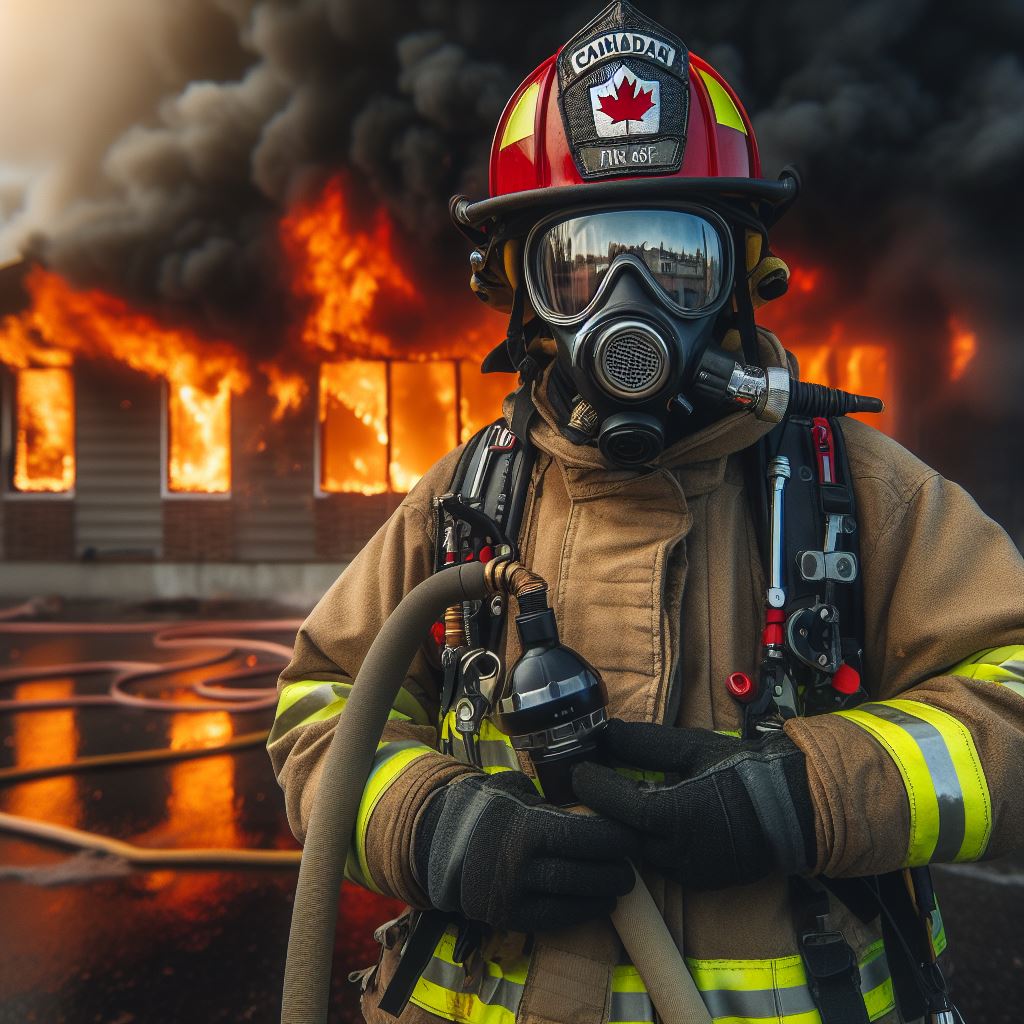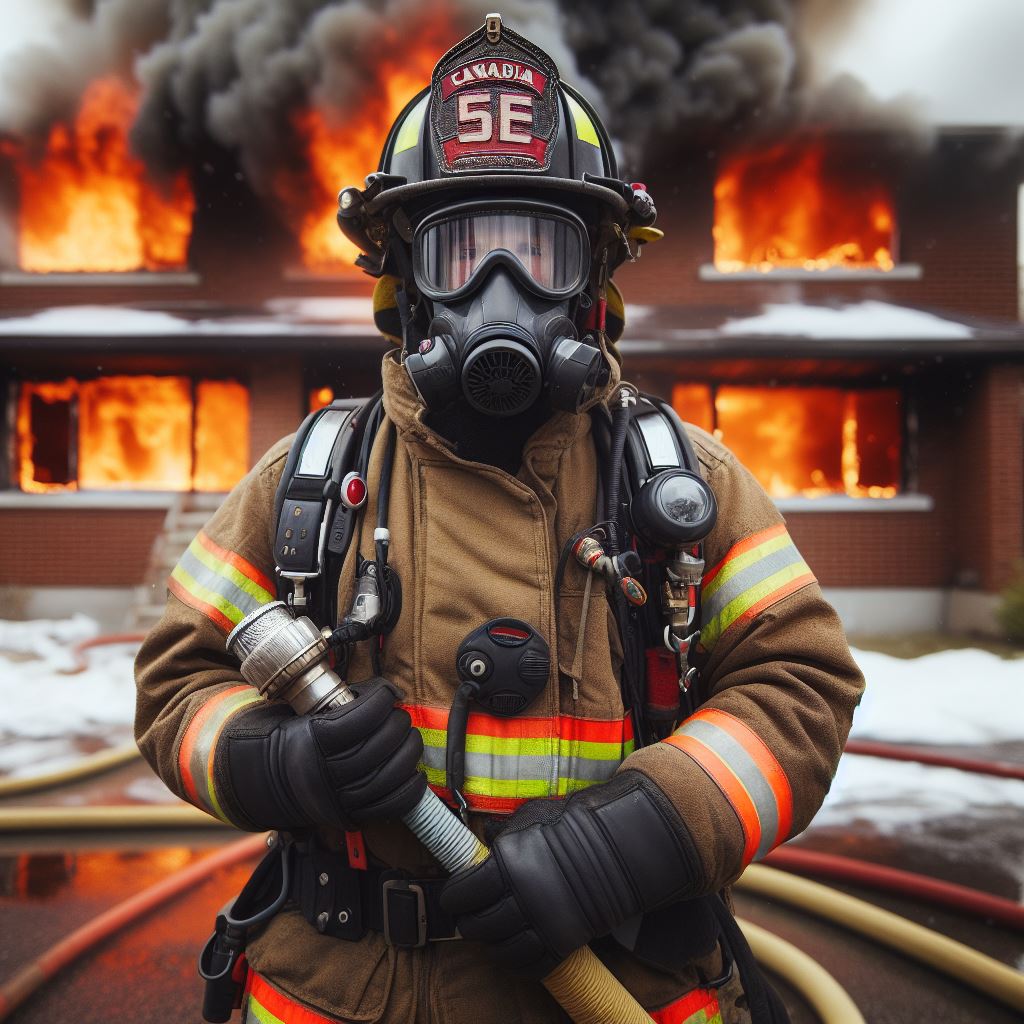Introduction
Mental health support is crucial for firefighters as they face traumatic experiences regularly and develop high levels of stress.
This blog post aims to explore the significance of providing mental health support for firefighters and its potential benefits.
Firefighters encounter intense incidents, witnessing accidents, fatalities, and catastrophic events that can have a profound impact on their mental well-being.
Supporting their mental health is crucial for maintaining their resilience, preventing burnout, and promoting overall well-being.
Firefighters are more likely to develop mental health issues such as depression, anxiety, and post-traumatic stress disorder (PTSD).
Providing mental health support can help reduce the stigma associated with seeking help, encouraging firefighters to prioritize their mental well-being.
Implementing effective mental health support programs can improve job satisfaction and retention rates among firefighters.
Regular training sessions and workshops can equip firefighters with coping strategies, stress management techniques, and tools to navigate challenging situations.
Creating safe spaces where firefighters can openly discuss their emotions and experiences is essential for their mental well-being.
Proactive mental health support can enhance decision-making abilities and overall job performance among firefighters.
Collaboration between mental health professionals and firefighting departments can ensure proper assessment and timely interventions.
In fact, prioritizing mental health support for firefighters is crucial to address the unique challenges they face and foster their well-being.
By implementing comprehensive support programs, we can help protect those who sacrifice their lives to protect us.
Overview of firefighter’s mental health
The unique challenges and stressors faced by firefighters
Firefighters face numerous challenges and stressors due to the nature of their job.
Firstly, the physical demands and dangers of fighting fires can be overwhelming. They risk their lives to save others.
Secondly, firefighters are often exposed to traumatic incidents, witnessing death, injury, and destruction on a regular basis.
Furthermore, the long working hours and unpredictable schedules can lead to sleep deprivation and disrupt their personal lives.
Additionally, firefighters face the constant pressure to perform under extreme conditions, leaving little room for errors.
Lastly, the culture within fire departments can discourage the expression of emotions, making it difficult to seek help.
The potential impact of such challenges on their mental well-being
The unique challenges and stressors faced by firefighters can have a significant impact on their mental well-being.
One of the most common issues is post-traumatic stress disorder (PTSD). Witnessing traumatic events can lead to severe emotional distress.
Depression and anxiety are also prevalent among firefighters. Constant exposure to stressful situations can take a toll on their mental health.
Substance abuse is another concern. Some firefighters may turn to alcohol or drugs as a coping mechanism, leading to addiction.
Suicide rates within the firefighting community are alarmingly high. The cumulative effect of stressors can lead to feelings of hopelessness and despair.
Relationship problems and family conflicts are often reported. The demanding nature of the job can strain personal relationships.
Unlock Your Career Potential
Visualize a clear path to success with our tailored Career Consulting service. Personalized insights in just 1-3 days.
Get StartedIn short, the mental health of firefighters should be a top priority. The unique challenges they face require adequate support and resources.
Ways to support firefighters’ mental health
There are several ways to provide mental health support for firefighters and improve their well-being.
Firstly, regular mental health check-ups should be prioritized. This will help identify any issues early on and provide necessary interventions.
Fire departments should implement peer support programs. This encourages firefighters to seek help from their colleagues who understand their experiences.
Education and training on mental health should be mandatory for all firefighters. This will help reduce the stigma surrounding mental health and increase awareness.
Access to confidential counseling services is crucial. Firefighters should have easy and confidential access to professional support whenever needed.
Flexible work schedules should be implemented to address the issue of long working hours and reduce the risk of burnout.
Finally, creating a supportive and empathetic culture within fire departments is essential.
Encouraging open communication and providing a safe space for sharing emotions can make a significant difference.
In review, firefighters face unique challenges and stressors that can have a detrimental impact on their mental well-being.
It is crucial to provide them with the necessary support and resources to protect their mental health.
By addressing these issues proactively, we can ensure that firefighters receive the care they deserve.
Existing mental health support programs for firefighters
The current initiatives in place to address mental health support for firefighters in Canada
- Peer support programs: Firefighters receive training to provide emotional assistance to their colleagues.
- Critical incident stress debriefings: Structured group sessions held after traumatic events to address emotional impact.
- Mental health training: Firefighters are educated on recognizing and managing their own mental health issues.
- Employee assistance programs: Confidential counseling services that address mental health and personal issues.
Effectiveness and limitations of these programs
The current mental health support programs have proven to be beneficial for firefighters.
- Peer support programs create a culture of understanding and trust within the fire department.
- Critical incident stress debriefings allow firefighters to share their emotions and receive support.
- Mental health training equips firefighters with tools to recognize and manage their own mental health.
- Employee assistance programs provide access to professional help for mental health concerns.
However, these programs also have limitations that need to be addressed:
- Insufficient resources: Funding constraints may limit the availability and quality of mental health support programs.
- Stigma and fear: Firefighters may hesitate to seek help due to concerns about job security and stigma.
- Timely access: Limited availability of mental health professionals may result in long waiting periods for assistance.
- Continued monitoring: Regular assessments and follow-ups are crucial to ensure long-term mental well-being.
In order to improve mental health support for firefighters, the following measures can be implemented:
- Increased funding: Governments and relevant organizations should allocate more resources to mental health initiatives.
- Reducing stigma: Promote open discussions about mental health to eliminate the fear of seeking help.
- Enhanced training: Provide continuous mental health training to equip firefighters with effective coping strategies.
- Collaboration: Foster partnerships between mental health professionals and fire departments to ensure timely access.
It is essential to prioritize the mental well-being of firefighters who face high levels of stress and trauma.
By strengthening existing programs and addressing their limitations, we can ensure proper support for these brave individuals.
The need for tailored mental health support
Firefighters play a crucial role in society, often risking their lives to save others in emergency situations.
While their physical well-being is commonly acknowledged, their mental health is equally important but often overlooked.
Therefore, there is a pressing need for tailored mental health support for firefighters.
This section will emphasize the importance of customized approaches to mental health support for firefighters and highlight the role of recognizing and addressing their specific needs and experiences.
Recognizing the Importance of Customized Approaches
- Firefighters face unique challenges that can have a significant impact on their mental well-being.
- A one-size-fits-all approach to mental health support is insufficient in addressing the complexities of their experiences.
- Recognizing the individuality of firefighters is crucial for effective intervention and support.
- Customized approaches can provide targeted assistance that acknowledges the specific needs of each firefighter.
- By tailoring mental health support, professionals can address the diverse range of stressors experienced by firefighters.
Addressing Specific Needs and Experiences
- Firefighters are regularly exposed to traumatic events, which can lead to the development of post-traumatic stress disorder (PTSD).
- Support programs should directly concentrate on managing PTSD symptoms and promoting mental resilience.
- Mental health initiatives must address the unique challenges that come with the unpredictable nature of firefighting.
- Efforts should be made to normalize seeking help and reducing the stigma surrounding mental health concerns.
- Providing access to specialized counseling services that are familiar with firefighter-specific traumas is essential.
- Collaboration between mental health professionals and firefighters can lead to the development of effective, individualized support plans.
- Creating safe spaces for firefighters to share their experiences and emotions can contribute to their overall well-being.
- Peer support programs can play a crucial role in fostering a sense of community and understanding among firefighters.
- Mental health support should extend beyond emergencies to include ongoing wellness checks and education programs.
- Incorporating stress management techniques into daily routines can help firefighters cope with the demands of their job.
Overall, the mental health support for firefighters needs to be tailored to address their specific needs and experiences.
Recognizing the importance of customized approaches and addressing the challenges they face are crucial steps towards ensuring their well-being.
By providing targeted support and promoting a culture of openness, we can help firefighters maintain their mental health throughout their demanding careers.

Best practices for mental health support
Creating a strong mental health support system for firefighters demands proactive strategies and effective interventions.
Tailor a comprehensive mental health program, incorporating education, awareness, and training.
Conduct regular mental health assessments for early identification and intervention.
Cultivate a stigma-free culture that encourages open communication and help-seeking.
Provide confidential and specialized mental health resources, including counseling and support groups.
Emphasize work-life balance to mitigate stress and burnout.
Train peer support teams within the firefighter community for immediate emotional aid.
Equip firefighters with coping mechanisms and stress management techniques.
Collaborate with mental health professionals for trauma-specific interventions. Conduct critical incident stress debriefing after significant events.
Develop resilience-building programs to enhance coping skills.
Establish a peer support network for retired firefighters.
Regularly evaluate and improve mental health support programs to ensure ongoing effectiveness.
Supporting firefighters’ mental health is crucial for their overall well-being and resilience.
Collaboration with mental health professionals
- Integration of mental health professionals within fire departments offers numerous benefits.
- These professionals can provide specialized support to address the mental health needs of firefighters.
- Collaboration ensures early detection and early intervention in cases of mental health issues.
- Mental health professionals can assist in developing personalized coping strategies for firefighters.
- They can provide individual counseling to address specific concerns and facilitate emotional healing.
- Collaboration offers a multidisciplinary approach, blending expertise from both firefighting and mental health fields.
- It promotes a collective understanding of the unique challenges faced by firefighters.
- Mental health professionals can educate firefighters about signs and symptoms of mental health issues.
- They can provide strategies to enhance mental resilience and promote overall well-being.
- Integration encourages a proactive approach to mental health, reducing stigma and increasing accessibility to support.
Importance of training and ongoing support for mental health professionals
- Comprehensive training ensures mental health professionals understand the specific needs and stressors of firefighters.
- Training equips them with the necessary skills to provide effective support and interventions.
- Ongoing support allows mental health professionals to stay updated with current research and practices.
- Regular supervision and consultation provide opportunities for professional growth and skill enhancement.
- Firefighters benefit from the expertise of well-trained mental health professionals.
- Ongoing support ensures mental health professionals can adapt to evolving challenges within the fire service.
- It enables professionals to provide continuous support during critical incidents and long-term recovery processes.
- Regular debriefings and peer support groups help mental health professionals manage their own well-being.
- Ongoing support for professionals empowers them to create a safe and trusting environment for firefighters.
- Collaboration between mental health professionals and fire departments is a strategic investment in overall firefighter well-being.
By integrating mental health professionals within fire departments, collaborating through training and ongoing support, firefighters can receive the necessary mental health support.
This collaboration allows for a holistic approach that addresses the unique challenges faced by firefighters.
Mental health professionals can provide specialized support, guidance, and counseling to promote mental resilience and well-being.
The integration also reduces stigma and increases accessibility to mental health services.
By investing in the training and ongoing support for these professionals, fire departments prioritize the mental health of their firefighters and create a culture that supports emotional well-being.
This collaboration is essential for ensuring the mental well-being of those who risk their lives to protect others.
Read: Top Firefighting Schools Across Canada
Stigma and cultural barriers
Stigma and cultural barriers are significant challenges when it comes to addressing mental health in the firefighting community.
Often, individuals within this community face unique pressures and expectations that can hinder their ability to seek help and support for mental health issues.
This blog section will explore the cultural stigma surrounding mental health within the firefighting community and discuss various ways to combat this stigma and encourage open discussions about mental well-being.
Addressing the cultural stigma around mental health within the firefighting community
- Acknowledge the existence of stigma: It is crucial to recognize that stigma exists within the firefighting community and that mental health concerns are often overlooked or dismissed.
- Understand the specific challenges of the firefighting profession: Firefighters are often perceived as strong and brave individuals, which can make it difficult for them to admit vulnerability or seek help for mental health issues.
- Educate the community: Increase awareness about the realities of mental health challenges faced by firefighters and shed light on the benefits of seeking help and support.
- Promote open dialogue: Encourage conversations about mental health, create safe spaces where firefighters can share their experiences and concerns without judgment or fear of repercussions.
Combatting stigma and encouraging open discussions about mental well-being
- Provide adequate mental health resources: Ensure access to mental health support services, including counseling, therapy, and peer support groups specifically tailored to the needs of firefighters.
- Train firefighters in mental health awareness: Offer specialized training programs that equip firefighters with knowledge about mental health issues, how to recognize warning signs, and how to support colleagues.
- Foster a supportive workplace culture: Cultivate an environment that values mental well-being and emphasizes the importance of seeking help, allowing firefighters to feel comfortable disclosing their challenges without fear of disciplinary action.
- Share success stories: Highlight stories of firefighters who have sought help for mental health issues and successfully navigated their recovery. This can inspire others to take similar steps.
- Engage in community initiatives: Collaborate with mental health organizations and community partners to organize events, workshops, and awareness campaigns focused on promoting mental well-being within the firefighting community.
- Advocate for policy changes: Work toward implementing policies that prioritize mental health support for firefighters, such as regular mental health check-ups, flexible work schedules, and access to comprehensive employee assistance programs.
- Offer peer support programs: Establish peer support networks where firefighters can connect with colleagues who have experienced similar challenges, providing guidance, empathy, and understanding.
- Involve family and loved ones: Educate family members and loved ones about mental health challenges faced by firefighters, ensuring they can support their firefighter in seeking help and understanding their unique experiences.
In general, combating the cultural stigma surrounding mental health within the firefighting community requires a multi-faceted approach.
By acknowledging the existence of stigma, providing adequate resources, promoting open dialogue, and involving key stakeholders, we can work together to create a supportive environment that encourages mental well-being among firefighters.
Read: Essential Gear for Firefighters in Canada
The Role of Peer Support
Firefighters confront unique mental health challenges daily, exposed to trauma and stress impacting their well-being.
Peer support emerges as a crucial mental health pillar for firefighters, providing a safe space for open discussions.
This support fosters camaraderie, understanding, and a culture where seeking help is encouraged.
Peer support programs bring additional, accessible, and relatable assistance, complementing existing mental health services.
They identify stressors early, preventing escalation, and offer real-time help during critical incidents, promoting swift recovery.
Cost-effective and promoting resilience, these programs allocate resources efficiently, aiding both personal and professional development.
For optimal effectiveness, clear guidelines, training, and ongoing education for peer supporters are essential.
Generally, establishing peer support programs within fire departments ensures firefighters receive the necessary mental health support, fortifying their well-being as they protect our communities.
Read: Ethical Dilemmas Faced by Policemen
Collaboration with the community
Collaborating with the community is key in supporting firefighters’ mental health, fostering understanding of their unique challenges.
Communities can provide tailored resources and essential services, raising awareness about firefighters’ mental health needs.
Successful initiatives, like the “Firefighter Support Group,” create a safe space for sharing experiences and seeking guidance.
“Mental Health First Aid” programs, organized in collaboration with communities, equip members with skills to identify and support firefighters in distress.
Reducing stigma, these initiatives involve the community in events like the “Firefighter Mental Health Awareness Walk,” fostering solidarity and understanding.
Partnerships with mental health organizations, exemplified by the “Mental Health Outreach Program,” provide on-site counseling, removing barriers to help-seeking.
Peer support programs, facilitated by community engagement, allow firefighters to share experiences, fostering a unique understanding.
Utilizing social media, fire departments collaborate with communities to create online support groups, breaking down geographical barriers.
In essence, community involvement is essential for addressing firefighters’ mental health, ensuring they receive understanding, resources, and services.
Read: Canadian Police Forces and Diversity
Conclusion
In this blog post, we have discussed the crucial need for mental health support for firefighters.
We explored the challenges they face and the impact it has on their overall well-being.
It is essential to prioritize mental health support for firefighters as they cope with traumatic experiences on a daily basis.
Ignoring their mental well-being can lead to serious consequences, including post-traumatic stress disorder and even suicide.
To address this issue, it is vital for readers to take action and support initiatives that promote mental well-being in the firefighting profession.
By advocating for improved mental health services and creating a culture of open dialogue, we can ensure that firefighters get the support they desperately need.
Let us not forget the sacrifices firefighters make to protect our lives and communities.
They not only battle flames but also face psychological challenges that can have a lasting impact on their lives.
It is our responsibility to provide them with the assistance they require.
Together, we can make a difference by spreading awareness, supporting organizations dedicated to mental health assistance, and encouraging policy changes that prioritize the mental well-being of firefighters.
Let us stand united to ensure that our brave firefighters receive the care and support they deserve.




